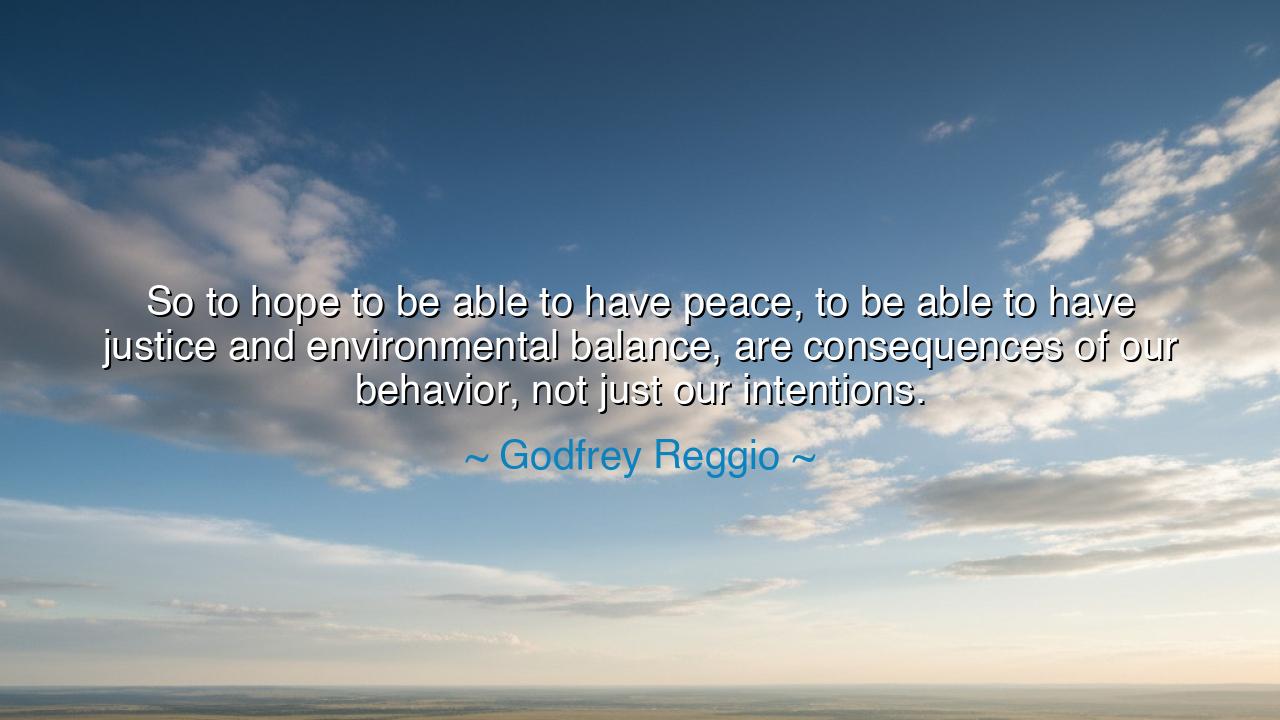
So to hope to be able to have peace, to be able to have justice
So to hope to be able to have peace, to be able to have justice and environmental balance, are consequences of our behavior, not just our intentions.






Hear the words of Godfrey Reggio, who spoke with the gravity of one who had gazed upon both the beauty and brokenness of the world: “So to hope to be able to have peace, to be able to have justice and environmental balance, are consequences of our behavior, not just our intentions.” In this utterance lies a stern but liberating truth—that noble dreams are not born into being by thought alone, but by the deeds of those who dare to live them. For the earth does not bend to our wishes, nor does justice spring forth from words unacted; only through our behavior are these hopes made flesh.
Reggio speaks of peace, justice, and environmental balance, the three pillars upon which any true civilization must rest. Yet he reminds us that these are not gifts that descend from the heavens, nor promises secured by mere intention. They are consequences, the fruit of the tree we cultivate through our actions. To sow selfishness and neglect is to reap war, injustice, and ruin. To sow compassion, discipline, and care for the earth is to reap harmony among peoples, fairness among nations, and balance with creation.
Consider the story of Mahatma Gandhi, who did not merely dream of peace, but embodied it through nonviolent resistance. His intention was freedom, yes, but his daily behavior—his marches, his discipline, his refusal to retaliate—made that intention manifest. Through action, his hope became reality, shaking the foundations of an empire. So too with environmental balance: the intention to protect the earth is nothing if we still waste, pollute, and consume carelessly. It is only when behavior aligns with principle that change truly arises.
Reggio’s words also carry warning. Many speak of justice, yet live unjustly in their dealings with others. Many praise the environment, yet waste water, burn fuel, and consume thoughtlessly. Many cry for peace, yet nurture anger in their hearts and violence in their words. Such contradictions reveal the weakness of intention without behavior. For the soul is not measured by what it wishes to be, but by what it chooses to do. The ancients taught the same: virtue is not in the idea of good, but in the practice of it.
And yet, Reggio’s wisdom is not meant to condemn, but to awaken. If peace, justice, and balance are consequences, then they are within our power, for our choices shape them. We need not wait for governments or gods to deliver them—we create them each day by the way we treat our neighbor, by the way we govern our desires, by the way we honor the earth beneath our feet. The smallest act of kindness, the smallest restraint of greed, the smallest reverence for nature, all ripple outward to form the larger whole.
The lesson is clear: let intentions be the spark, but let behavior be the flame. It is not enough to wish for a just world—we must act justly. It is not enough to admire nature—we must live in ways that protect it. It is not enough to dream of peace—we must embody peace in our words, our choices, and our lives. For the world is shaped not by the promises we make to ourselves, but by the actions we take toward others and toward the earth.
Practical action follows. Examine your daily life: do your habits nurture balance, or destroy it? Do your choices uplift justice, or undermine it? Do your words and deeds bring peace, or breed conflict? Choose consciously, for every decision is a seed planted in the soil of the future. Support movements for environmental care, live simply, speak truth with compassion, and practice fairness in small and great matters alike.
Thus, Godfrey Reggio’s words must be carried forward as a beacon: that peace, justice, and environmental balance will never be secured by dreamers alone, but by doers who live their dreams into being. Let this wisdom guide future generations—that noble intentions are the beginning, but only righteous behavior can carve them into reality. For the fate of the world is not written in hopes, but in deeds.






AAdministratorAdministrator
Welcome, honored guests. Please leave a comment, we will respond soon